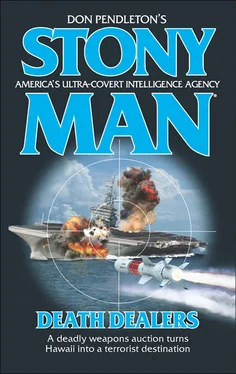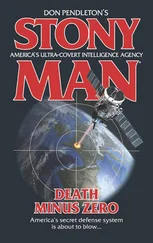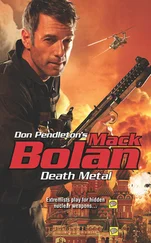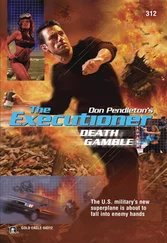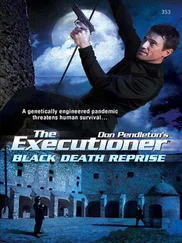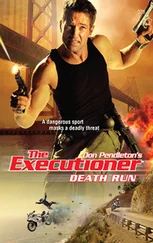“So what happened up north?” McCarter asked.
Mei held her tongue for a moment, looking as if she didn’t want to say exactly. “Have you heard of the Beijing Weather Modification Office?”
“Yup,” McCarter answered. He didn’t say that Price had thrown him an encrypted text mentioning the possible involvement of the agency before he arrived at the bar. “Personally, I always wondered why they assigned almost forty thousand blokes to a rainmaking operation.”
“They are effective,” Mei returned. “They’ve done a hell of a lot of work.”
“And some of it might just be weaponized weather?” McCarter asked.
Mei nodded.
“Far be it from me to be skeptical, especially in the wake of taking out the Dragon’s Eye, a laser that could have leveled Taiwan, but how can cloud seeding and hailstorm busting be that much of a threat?” McCarter asked. “I realize that playing around with the climate on the scale of the nation of China could affect world climate patterns, but no rainstorm is going to take out an aircraft carrier group.”
“No, you would need something along the lines of a hurricane,” Mei returned.
That hit McCarter like a lump of iron slag in the stomach. “Hurricane? How?”
“In Taiwan, we were aware of the possibilities that China was working on a Massive Ordnance Air Burst explosive as a possible aircraft-carrier-killing missile. Enough to destroy the ship and perhaps cripple the support craft around it, without being an actual nuclear attack,” Mei said.
McCarter was familiar with the MOAB, a thermobaric explosive that came in two parts. One being a burst that diffused inflammable fuel or explosive dust over a large area, while the second ignited the aerosolized cloud, which itself would detonate. With a large dome of fire detonating, it would produce enormous pressure. In the twentieth century, they’d called the bomb a Daisy Cutter, since the detonation would cut every living thing down in the area, all the way down to the daisies. “I’ve had Gary make one or two of those.”
“I figured,” Mei responded. “Are you here alone?”
“I left them behind. I don’t need a bloody set of chaperones for a date with my girl,” McCarter answered.
Mei smiled. “You know that I have my own support crew around the place.”
“Especially the bartender,” McCarter noted. “Unless Taiwan took over the Russians’ telepathic research.”
Mei stuck out her tongue. It was meant to be a defiant gesture, but to David it was just unbearably cute. He leaned in and took a quick taste, lips crushed against hers. He didn’t want to break the kiss, but there was still business to attend to.
Mei cleared her throat. “The Dong-Feng can carry Multiple Individual Reentry Vehicles—I’m sure you remember MIRVs from the days when the USSR and dinosaurs roamed the Earth.”
McCarter gave her a poke in her stomach. “Was that an age joke?”
Mei chuckled. “Just making certain you’re paying attention and not undressing me with your eyes.”
“My eyes and ears can work independently, love,” McCarter said. “Right now, my eyes are snogging the hell out of your naked self.”
Mei smiled, then poked him in the center of the forehead. “Well, ears, pick this up. MIRVs can have any sort of warhead. Nuclear. Conventional. MOAB. Cloud seeder.”
McCarter suddenly felt himself focus, sitting a little straighter. “Seed the clouds over the ocean. And then do something that could increase the water temperature over a vast area.”
“Like, say, the thermobaric cloud from a MOAB,” Mei said. “What isn’t superheated gets vaporized by the blast, adding to the humidity. The sudden lack of air pressure sucks in more air...”
McCarter frowned. “Boom! One hurricane bomb.”
“Made from readily available materials, not just the Dong-Feng family of missiles,” Mei said. “The mathematics and physics of it are just way outside of my limits.”
“But if you hire thirty-seven thousand weather scientists and mathematicians, they could do the grunt work,” McCarter returned. “Damn.”
He started thinking about why the marauders would have wanted a Mach 10–capable engine and a guidance system meant to defeat radar when it clicked with him.
If you fired a ballistic missile, it would definitely show up on radars around the world. But, if you could take the individual components of different warheads and put those on the ends of the rockets, you could deliver all that firepower without giving away the fact that an ICBM was launched toward you to drop a hurricane on your doorstep, or let your original location be known. That had been one of the most troublesome contentions of tracking the origin of the two different attacks, as the missile blasts preceding them had followed a nap-of-the-earth course.
He’d have to run the general idea past people who were far smarter than him. McCarter was smart, but he was far from being a rocket scientist. These things sounded possible, and there was a United Nations resolution and treaty to prevent the weaponization of weather. Unfortunately, the United States was not a signatory, and neither were many other countries.
While all of this ran through his mind, he finished the cocktail that Mei had bought for him—his taste buds agreeing with her that it was delicious. He stroked her hair, squeezed her hand and hugged her tighter off and on. The time he put into thinking about the possibilities of the Chinese and American weapons systems combined felt all too long, and he was coming nowhere close to a solution, while the time he spent reveling in the warmth and human contact he shared with Mei was like the flicker of an instant.
He recalled what Gary Manning had said about Einstein and time relativity. “A second with your hand on a hot stove is like an eternity. A day with a girl you love is like a fleeting instant.”
Of course, McCarter liked the pool-table description of time and space interacting, too.
“So, why did you give me the pocket rocket?” McCarter asked.
Mei smirked. “Don’t I always... Oh, the revolver.”
“Cheeky girl,” McCarter chuckled.
“The informant who relayed the tidbits about the ‘hurricane’ missile was reported as having committed suicide,” Mei said. “He threw himself out of a fourth-story window. And when that didn’t work, he curb-stomped himself.”
“Curb-stomped. Figuratively?”
“Literally,” Mei answered.
McCarter wrinkled his nose. The literal act of a curb stomp was to set someone’s head and upper jaw against a hard, raised surface. Then, the person was either kicked in the neck, or a foot was brought heavily down. The result ended with torn cheeks, a crushed lower jaw and a skull messily separated from neck vertebrae. It was one of the most brutal means of murder McCarter had ever seen, one that even he hadn’t used in battle.
“You’re covered, right?” McCarter asked.
Mei nodded. “I’m paranoid as hell. And I’m surrounded by my people.”
McCarter could see the flicker of fear in those dark, almond eyes. He knew from personal experience that only the most brash of fools was never afraid.
“I’ll do you a solid, love,” McCarter murmured, lips close and brushing her ear.
“You’re not going to make yourself bait,” Mei said. “That’s insane.”
“Insane is my middle name,” McCarter countered. “Besides, if I can find the bastards who killed that informant, I could get a better handle on who made the theft.”
“And what if it’s MSS plugging a leak?” Mei asked.
“Then the Commie buggers have it coming for building a goddamn fleet-killing hurricane bomb.”
McCarter took out his phone and transmitted a file to her device.
Читать дальше
